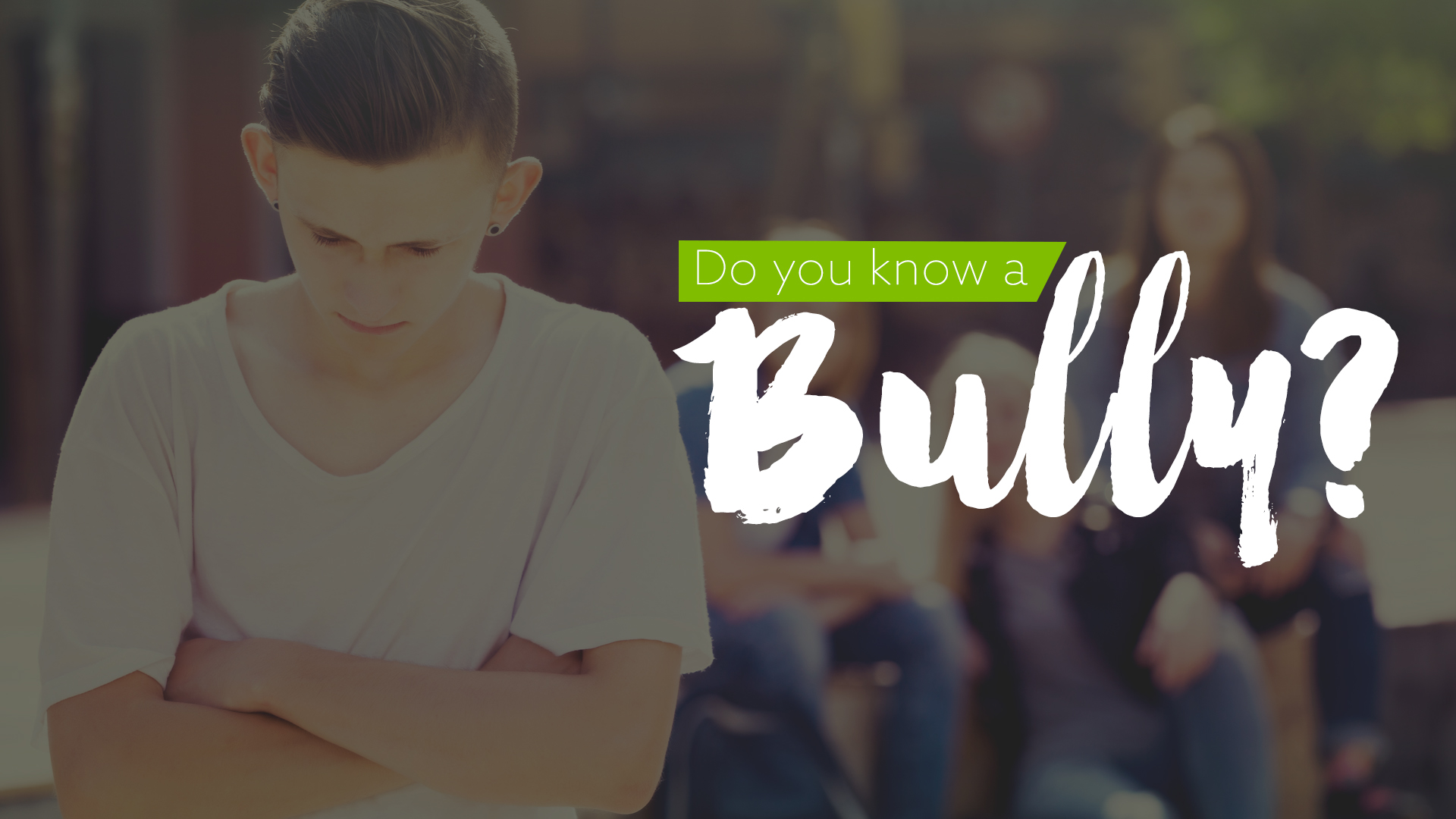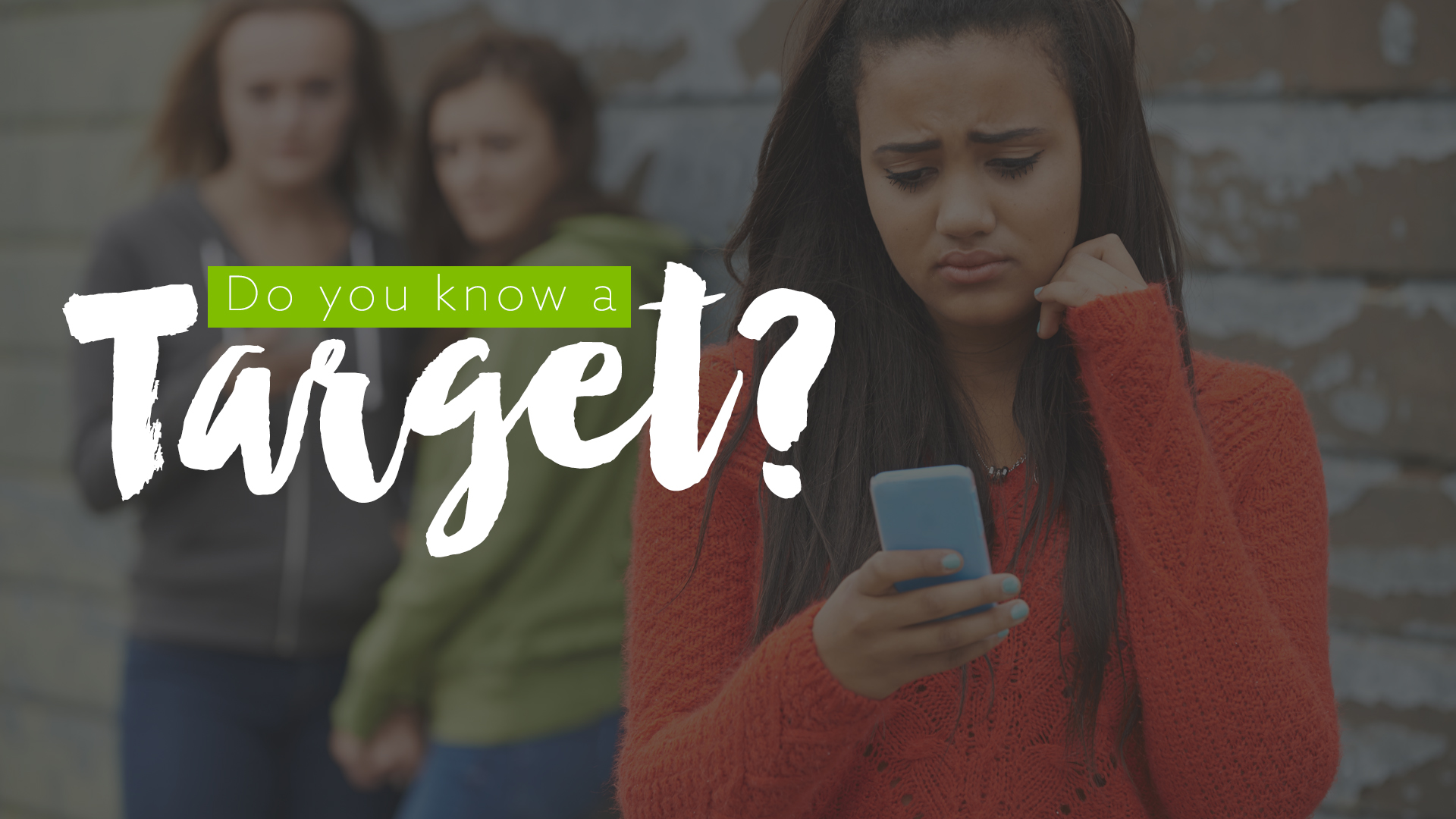
Episode #1
What Is Bullying? The definition of bullying is when someone is intentionally hurt or humiliated by words or behavior.
Episode #2
Do you know a bully? Anyone can become a bully- it can be the tough kid, but it can also be the honor student- don’t stereotype the bully.
Episode #3
Do you know a target? Bullying happens any time that a person is hurt or harassed and feels powerless to make it stop. This makes the person a target.

What is bullying?
The definition of bullying is when someone is intentionally hurt or humiliated by words or behavior.
- Bullying is often repeated.
- The person being bullied feels powerless to stop it.
- Anyone can be a bully or a target.
Types of bullying:
Physical: hitting, touching, intimidation by proximity, touching, rude gestures and taking/breaking possessions.
Emotional: teasing, mocking, excluding, name calling, starting rumors.
Cyberbullying: the use of technology (texts, calls, email, social media) to bully by harassing, threatening, starting rumors, posting pictures **this type of bullying leaves the person being bullied unable to escape.
Bullying is wrong- everyone has a right to be safe!
Effects of bullying:
- Significant physical impact including problems eating, sleeping, headaches or stomach issues.
- Significant psychological impact including anxiety, shame, depression, trauma and even suicide can be a result of bullying
- Dropping out of school or activities, not wanting to leave the house.
It is never okay to make someone feel this way and or to say they should just “handle” it or have “thicker skin.”
Do you know a bully?
Anyone can become a bully- it can be the tough kid, but it can also be the honor student- don’t stereotype the bully.
Bullying is about behavior toward another person:
- Using words and actions to intimidate and harass.
- Causing people intentional discomfort and fear.
- Continuing regardless of the other person asking you to stop, despite the fact that they feel they cannot defend themselves.
Questions to ask if you think you’re a bully:
- Do you hurt others on purpose?
- Are people afraid of you?
- Do you feel better about yourself by putting others down?
- Do you feel you can make people do what you want?
- Do you blame other people for your problems?
- Do you take or break the possessions of others?
- Do you feel like making fun of people is no big deal- or that they should just get over it?
If you answered yes to these questions, YOU could be the bully.
Why bully?
- Some people bully to it be funny, or feel included in the peer group
- Some do it because of feelings of insecurity.
- Some do it because they have been bullied in the past.
- Or it helps the bully to vent displaced anger/frustration/sadness.
If YOU have this issue:
- Think about how you are affecting someone else.
- Know that making friends at the expense of others is not acceptable.
- Talk to someone you trust if you are/have been bullied.
- There are other ways to manage negative feelings.
Remember that sometimes these situations can seem innocent- like a sarcastic comment, a joke or calling someone out to be funny. It’s not cool to make someone feel uncomfortable. If what you are saying/doing, or what someone is saying/doing to you, is uncomfortable, it should stop.
Do you know a target?
Bullying happens any time that a person is hurt or harassed and feels powerless to make it stop. This makes the person a target.
People who are bullied:
- May have difficulty communicating in an assertive way.
- May be socially isolated.
- May belong to a marginalized group or group that is perceived as powerless.
Questions to ask if you think you are a target:
- Do you ever feel isolated, afraid or unsafe?
- Do you ever feel intentionally excluded from peer groups?
- Have you ever been physically intimidated, hurt or had your possessions taken or broken and felt like you could not make it stop?
- Have you been called mean names, received rude gestures or had rumors spread about you and felt like you could not make it stop?
- Have you ever had rumors spread about you or received negative comments/pictures or threats through the use of technology, including social media, email or cell phone?
If you answered yes to these questions, YOU could be a target.
Sometimes people who are bullied do not reach out for help.
- Remember that being bullied is not a choice!
- Individuals who are bullied might feel fearful to ask for help.
- They may be embarrassed that they are being bullied and don’t want to admit it.
- They may perceive that they are isolated and that no one cares.
- They feel they are exaggerating the circumstances.
- They feel like they need to manage the problem on their own.
- They feel like they deserve it.
Being bullied is not okay- ever- and is not the fault of the target. Tell someone. Don’t think you are being dramatic or feel like you should be able to manage the problem independently. There are people who can help you.
What to do?
If this is happening to you and you are feeling depressed and suicidal, don’t give up! There is help available and you deserve support. You can access immediate support through TeenCentral by accessing the Help page or by calling 911 or your local emergency medical services.
If it’s you:
- First, remember that you never deserve to feel unsafe.
- Never keep it a secret; often it will become worse.
- Tell a trusted adult, such as a parent, family member, teacher, or coach- be sure to tell them the names of the people involved and the things you’ve already tried to get them to stop their behavior.
- If you are uncomfortable, reach out to someone anonymously to ask for help
- If you don’t receive help the first time, keep trying.
- Remain in areas where you will not encounter the bully, do not allow them to separate you from a larger group.
- Do things that build your self-esteem, seek out positive peers.
- Use assertive communication with the bully- in a firm and steady voice, ask the person bullying you to leave you alone. Don’t yell or threaten.
- Surround yourself with a positive support network.
- Reach out to the police.
If it’s someone else:
Remember that you can make a difference.
Create safer spaces:
- Let others around you know that bullying in your presence is not okay!
- Don’t just accept a bully- talk to them about treating people differently if you can safely do so.
Get help for the target of the bully:
- Talk to them to prevent isolation and let them know that this treatment is not acceptable or normal.
- Encourage them to get help, even offer to go with them.
- Tell someone yourself!
If it’s cyberbullying:
- Don’t read it, ignore it, delete it or block them.
- Don’t respond- they are looking for a reaction.
- Let someone else know. This can include parents, caregivers or other trusted adults. You can even print it or attach it to an email and send it to the police.
Remember that bullying is a big issue- most states have laws against it and schools often implement zero tolerance policies for bullying.
You can contribute to a better and safer world for everyone!
- Treat others with kindness.
- Celebrate the uniqueness of others- lift them up instead of putting them down, don’t call them out.
- Don’t perpetuate the hate- speak out against it!



